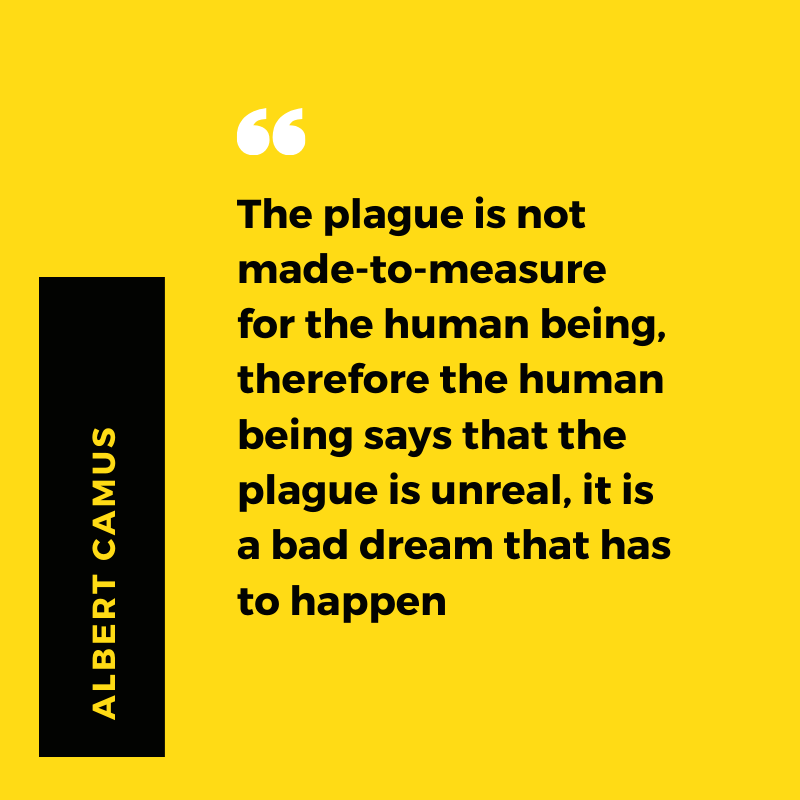Modern societies have developed immune systems to deal with epidemics: international cooperation, social cohesion, universal health care systems. But today we face the greatest planetary emergency since World War II with these immune systems severely weakened: populist nationalisms disrupt international cooperation and promote every-man-for-himself, and the anti-science wave infects the debate with irrationality.

“There have been as many plagues as wars in history; yet always plagues and wars take people equally by surprise.” So writes Albert Camus in The Plague, a classic turned into a sudden bestseller: It is already the third best-selling book in Italy, the country that was caught unawares by the epidemic.
Camus writes that “A pestilence isn’t a thing made to man’s measure; therefore we tell ourselves that pestilence is a mere bogy of the mind, a bad dream that will pass away.”
However, that bad dream is here.

Official estimates are nightmarish. In Germany, the United Kingdom, and the United States, they foresee the contagion of up to 40, 60, or 70 percent of the population. Radical measures are taken with a modest objective, “flatten the curve,” so that cases are distributed over time and health systems do not collapse. Such a collapse is already happening in Italy, where daily deaths are in the hundreds. Some doctors have no choice but to let people die if they are too old or too sick.
The global economy enters an induced coma, with travel, production, and supply chains halting to slow the epidemic. This week, we already had the worst stock market crash in the history of Europe and the biggest drop in the US market in 33 years.
The effects are unpredictable because epidemics scar human history: The Plague of Athens marked the end of the Athenian splendor, and the Black Plague buried the power of the feudal lords and smoothed out the rise of the bourgeoisie.
Modern societies have developed immune systems to deal with epidemics. They are based on international cooperation in the face of global threats; social cohesion, which allows acting in solidarity; a robust and universal healthcare system; and an efficient and credible state, which follows scientific criteria to take action.
But today we face the greatest planetary emergency since World War II with these immune systems severely weakened.
Western democracies are more unequal and their states weaker, populist nationalisms disrupt international cooperation and promote every-man-for-himself, and the anti-science wave infects the debate with irrationality.
In the United States, President Trump had dissolved the White House pandemic preparedness team in 2018, and spent weeks downgrading the coronavirus threat: He said that cases will be “close to zero” and that the epidemic was the opposition’s “new deception.” From Mexico, another populist president also contributes to misinformation: “You have to hug, nothing happens,” says President López Obrador with joyful irresponsibility.

The immune system of Chilean society is also depressed, due to a context of social hatred and the discrediting of everything that smells of authority: This week, some ingenious people proclaimed that the coronavirus was a government invention to stop the country’s social movement.
On Thursday, it was declared that President Sebastián Piñera would announce measures on Saturday. He finally announced these measures on Friday night, followed by other measures announced by the Minister of Health on Saturday noon. It is not sustainable that the public communication of the crisis continues to be contaminated because Piñera simultaneously insists on blaming attacks that never occurred or delivering confusing versions as to when he found out about the fires in the Metro.
A president with a conflictive relationship with the truth, and zero credibility among citizens, is not the leader that one would dream of in this emergency. That is why there is an urgent need to depersonalize crisis management and to put daily communication in the hands of scientific spokespeople without a partisan agenda.
In Spain, the epidemiologist Fernando Simón has been in charge of emergencies such as Ebola for eight years, regardless of the political color of the government, and is a credible voice for citizens.
The opposition must also get serious and stop fantasizing about removing Piñera from power as secretary. Major political decisions are coming: Repeating a march like the one that took place on March 8 (8M) for Women’s Day is unthinkable, and even the scheduled April referendum on a new constitution is at risk. Britain and Louisiana have already decided to postpone elections. The responsible thing is to not bury your head in the sand when faced with such difficult dilemmas; all scenarios must be analyzed to prepare serious health and policy responses, based on scientific evidence.
We will not find those answers in conspiracy theories that see deceit and fraud in each event. Nor will we find them in the neoliberal extremism of those who insist, quoting Margaret Thatcher, that “there is no such thing as society.”
Well, it is precisely that society—that chain of relationships that unites us with family, colleagues, and strangers—that faces its greatest challenge. And its greatest challenge happens when all the structures that order society are questioned.
Perhaps this is the opportunity to regain lost empathy.
Our proverbial solidarity will be tested when each one of us decides, in each daily situation, how to take care of ourselves and how to take care of others. Hopefully, we discover, following Camus, “something that is learned in the midst of plagues: that there are more things in human beings worthy of admiration than contempt.”





